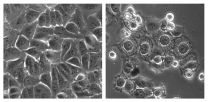Drug candidate kills cancer cells through overstimulation
2015-08-10
(Press-News.org) A drug candidate that overstimulates proteins crucial for tumor growth shows promise as a new strategy to treat a wide range of cancers. The demands of rapid cell division put a strain on cancer cells, and the approach works by tipping cell stress over the edge. In the August 10 issue of Cancer Cell, American researchers show that the drug candidate inhibits tumor growth in a mouse model of breast cancer and efficiently kills a broad range of human cancer cells.
"No prior drug has been previously developed or proposed that actually stimulates an oncogene to promote therapy," says co-senior study author David Lonard of Baylor College of Medicine. "Our prototype drug works in multiple types of cancers and encourages us that this could be a more general addition to the cancer drug arsenal."
Because cancer cells acquire mutations in oncogenes--genes that can transform cells into cancer cells--to support their growth and survival, a great deal of research has focused on identifying oncogenes that could be targeted by cancer drugs. Members of the steroid receptor coactivator (SRC) family of oncogenes are especially promising as therapeutic targets because these proteins sit at the nexus of key signaling pathways that cancer cells use to quickly grow, spread to other tissues, and acquire drug resistance. In a previous study, Lonard and co-senior study author Bert O'Malley of Baylor College of Medicine screened a large number of compounds to identify SRC-inhibiting molecules that kill a wide variety of cancer cells and inhibit tumor growth in animal models.
These compounds are similar to conventional therapies designed to inhibit the activity of key cancer oncogenes. But Lonard and O'Malley had a counterintuitive idea: what if they could disrupt key signaling pathways and kill cancer cells by overstimulating SRCs? After all, cancer cells rely heavily on SRCs to delicately orchestrate a wide range of cellular events, so SRC stimulation might be just as effective as SRC inhibition at disrupting the balance of signaling activity in cancer cells.
To test this idea, they screened hundreds of thousands of compounds to identify a potent SRC activator called MCB-613. This compound killed human breast, prostate, lung, and liver cancer cells, while sparing normal cells. When the researchers administered MCB-613 to 13 mice with breast cancer, the drug candidate almost completely eliminated tumor growth without causing toxicity, whereas tumors continued to grow by about 3-fold over 7 weeks in the control group of 14 mice.
MCB-613 killed cancer cells by causing the accumulation of unfolded proteins in a cell structure called the endoplasmic reticulum (ER). To support their rapid proliferation, cancer cells must synthesize a large number of proteins, putting a strain on the ER to keep up with its heavy workload of properly folding proteins. Overstimulation of SRCs places extra demands on the ER when it is already operating at maximum capacity, causing the accumulation of a large number of unfolded proteins. This triggers a cell stress response that in turn causes the build-up of toxic molecules called reactive oxygen species.
Taken together, the findings suggest that elevating SRC activity beyond the already high levels present in cancer cells further pressures their maximized stress response system and selectively kills them. In future studies, the researchers will continue to explore the mechanisms by which SRCs kill cancer cells and will screen for even better SRC activators. "We are optimistic that these drugs will eventually find their way into the clinic for use in patients," O'Malley says.
INFORMATION:
This work was supported by funding from the Susan G. Komen Foundation, the Prostate Cancer Foundation, the Clayton Foundation, the Dunn Foundation, the Department of Defense Breast Cancer Research Program, the Cancer Prevention and Research Institute of Texas, and the National Institutes of Health. Several authors are co-founders and hold stock in Coregon, Inc., which is developing steroid receptor coactivator stimulators for clinical use.
Cancer Cell, Wang et al.: "Characterization of a Steroid Receptor Coactivator Small Molecule Stimulator that Overstimulates Cancer Cells and Leads to Cell Stress and Death"
Cancer Cell, published by Cell Press, is a monthly journal that provides a high-profile forum to promote major advances in cancer research and oncology. The journal covers topics related to molecular and cellular mechanisms of cancer, mechanisms for the sensitivity and the resistance to cancer therapies, development of better cancer therapies, and clinical investigations. For more information, please visit http://www.cell.com/cancer-cell. To receive media alerts for Cancer Cell or other Cell Press journals, contact press@cell.com.
[Attachments] See images for this press release:

ELSE PRESS RELEASES FROM THIS DATE:
2015-08-10
Low-income people who struggle to put food on the table also use the health care system more, which means higher health care costs, according to new research published in CMAJ (Canadian Medical Association Journal).
"We know that people who have trouble affording the food they need have poorer health in general as well as more chronic disease," states Dr. Valerie Tarasuk, Department of Nutritional Sciences, University of Toronto, Toronto, Ontario.
The term "food insecurity" describes inadequate or insecure access to food because of financial constraints. In Canada in ...
2015-08-10
As California wildfires burn tree canopies and the forest floors they support, the plants that are replacing the understory are increasingly those found in more southern areas of the West, according to a study from the University of California, Davis.
"The plants we're finding underneath our forests are becoming more like those seen in Mexico and Southern California," said lead author Jens Stevens, a postdoctoral scholar with the UC Davis John Muir Institute of the Environment. "Under climate change, we're seeing species from drier, warmer areas increasingly taking over. ...
2015-08-10
BOSTON-The term "transgender" has made its way into mainstream media thanks to Caitlyn Jenner, previously known as Bruce Jenner, who came out as a transgender woman earlier this year. But for many physicians, or physicians-in-training, who do not typically treat transgender patients for issues specific to their gender identity, it's still a mystery.
Joshua Safer, MD, FACP, endocrinologist at Boston Medical Center and associate professor of medicine and molecular medicine at Boston University School of Medicine (BUSM), and his colleague Dylan Thomas, MD, conducted an ...
2015-08-10
Taking four pain pills an hour instead of four pills a day
Need improved, understandable discharge instructions
More than 9 million ambulatory surgeries performed annually on seniors
CHICAGO --- Patients 65 and older who have ambulatory surgery are much more likely to be readmitted to the hospital within 30 days than younger patients, regardless of their health before surgery, reports a new, large national Northwestern Medicine study. The likely cause, based on previous research, is difficulty understanding medication dosing and discharge instructions, as well ...
2015-08-10
Results of a 2013 DREAM Challenge - a crowdsourcing initiative for systems biomedicine - have been published in Nature Biotechnology;
Hundreds of scientists from around the world pooled their efforts to test how accurately they could predict the effect of toxic compounds in different individuals, or across a population;
Combined results achieved a rough estimate of population effects, and methods emerged that may be able to provide real-world benefit in the hazard assessments of new compounds.
10 August 2015 - An international study published in Nature Biotechnology ...
2015-08-10
Widespread drought-sensitive butterfly population extinctions could occur in the UK as early as 2050 according to a new study published today in the scientific journal Nature Climate Change.
However, the authors conclude that substantial greenhouse gas emission reductions combined with better management of landscapes, in particular reducing habitat fragmentation, will greatly improve the chances of drought-sensitive butterflies flying until at least 2100.
The study was led by Dr Tom Oliver from the UK's Centre for Ecology & Hydrology (CEH) in collaboration with colleagues ...
2015-08-10
An international research collaboration led by Massachusetts General Hospital (MGH) investigators has identified the first gene in which mutations cause the common form of mitral valve prolapse (MVP), a heart valve disorder that affects almost 2.5 percent of the population. In a paper receiving advance online publication in Nature, the research team reports finding mutations in a gene called DCHS1 in affected members of three families in which MVP is inherited.
"This work provides insights into the pathways regulating valve growth and development and implicates a previously ...
2015-08-10
A new computational method developed by scientists from the University of Chicago improves the detection of genes that are likely to be causal for complex diseases and biological traits. The method, PrediXcan, estimates gene expression levels across the whole genome - a better measure of biological action than single mutations - and integrates it with genome-wide association study (GWAS) data. PrediXcan has the potential to identify gene targets for therapeutic applications faster and with greater accuracy than traditional methods. It is described online in Nature Genetics ...
2015-08-10
JAMA Internal Medicine will publish a package of articles, along with an author interview podcast, focused on end-of-life, euthanasia and physician-assisted suicide. The original investigation, research letter, special communication and commentaries are detailed below.
In the first article, Marianne C. Snijdewind, M.A., of the VU University Medical Center, Amsterdam, and coauthors1 looked at outcomes of requests for euthanasia or physician-assisted suicide received by a clinic founded in 2012 to provide the option of euthanasia or physician-assisted suicide for patients ...
2015-08-10
For the past decade, cutting-edge health care providers and researchers have increasingly pushed to integrate care for mental health and substance use problems within primary medical care for children and adolescents. Their hope is that children and teens who suffer from mental and behavioral disorders would fare better if their pediatricians or family doctors took an active role in linking them with mental health care, particularly when these doctors team up with mental health clinicians to help meet the needs of their young patients.
Now, a team of UCLA researchers ...
LAST 30 PRESS RELEASES:
[Press-News.org] Drug candidate kills cancer cells through overstimulation

